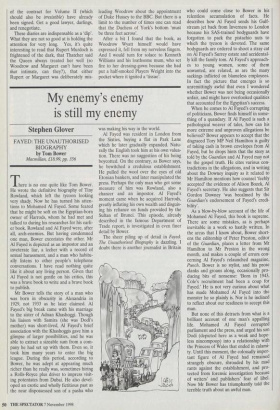My enemy's enemy is still my enemy
Stephen Glover
FAYED: THE UNAUTHORISED BIOGRAPHY by Tom Bower Macmillan, £18.99, pp. 356 here is no one quite like Tom Bower. He wrote the definitive biography of Tiny Rowland, which left the tycoon looking very shady. Now he has turned his atten- tions to Mohamed Al Fayed. Some feared that he might be soft on the Egyptian-born owner of Harrods, whom he had met and talked to during his researches for his earli- er book. Rowland and Al Fayed were, after all, arch-enemies. But having condemned one man, Bower excoriates the other. Mr Al Fayed is depicted as an impostor and an inveterate liar, a lecher with a record of sexual harassment, and a man who habitu- ally listens to other people's telephone conversations. I have read nothing quite like it about any living person. Given that Al Fayed is not gentle on his critics, this was a brave book to write and a brave book to publish.
Mr Bower tells the story of a man who was born in obscurity in Alexandria in 1929, not 1933 as he later claimed. Al Fayed's big break came with his marriage to the sister of Adnan Khashoggi. Though his liaison with Samira (she was Dodi's mother) was short-lived, Al Fayed's brief association with the Khashoggis gave him a glimpse of larger possibilities, and he was able to extract a sizeable sum from a com- pany he had set up with them. Even so, it took him many years to enter the big league. During this period, according to Bower, he was adept at appearing much richer than he really was, sometimes hiring a Rolls-Royce plus driver to impress visit- ing potentates from Dubai. He also devel- oped an exotic and wholly fictitious past as the near dispossessed son of a pasha who was making his way in the world.
Al Fayed was resident in London from the Sixties, buying a flat in Park Lane which he later gradually expanded. Natu- rally the English took him at his own valua- tion. There was no suggestion of his being boycotted. On the contrary, as Bower says, he bewitched a credulous establishment. He pulled the wool over the eyes of old Etonian bankers, and later manipulated the press. Perhaps the only man who got some measure of him was Rowland, also a chancer and an impostor. Al Fayed's moment came when he acquired Harrods, greatly inflating his own wealth and disguis- ing his reliance on funds provided by the Sultan of Brunei. This episode, already described in the famous Department of Trade report, is investigated in even finer detail by Bower.
The sheer piling up of detail in Fayed: The Unauthorised Biography is dazzling. I doubt there is another journalist in Britain who could come close to Bower in his relentless accumulation of facts. He describes how Al Fayed sends his Gulf- stream jet back from Inverness to London because his SAS-trained bodyguards have forgotten to pack the pistachio nuts to which the tycoon is devoted. The same bodyguards are ordered to shoot a stray cat on Al Fayed's Surrey estate and accidental- ly kill the family torn. Al Fayed's approach- es to young women, some of them unwanted, are related, as are the many sackings inflicted on blameless employees. In fact the picture that emerges is so unremittingly awful that even I wondered whether Bower was not being occasionally unfair, and might have overlooked qualities that accounted for the Egyptian's success.
When he comes to Al Fayed's corrupting of politicians, Bower finds himself in some- thing of a quandary. If Al Fayed is such a pathological weaver of tales, how can his more extreme and unproven allegations be believed? Bower appears to accept that the disgraced Tory MP Neil Hamilton is guilty of taking cash in brown envelopes from Al Fayed, but he drops hints that the story as told by the Guardian and Al Fayed may not be the gospel truth. He cites various con- tradictions in the allegations, and in writing about the Downey inquiry as it related to Mr Hamilton mentions how counsel 'feebly accepted' the evidence of Alison Bozek, Al Fayed's secretary. He also suggests that Sir Gordon Downey 'was becalmed by the Guardian's endorsement of Fayed's credi- bility'.
As a blow-by-blow account of the life of Mohamed Al Fayed, this book is supreme. There are some mistakes, as is perhaps inevitable in a work so hastily written. In the areas that I know about, Bower short- ens the editorship of Peter Preston, editor of the Guardian, places a letter from Mr Hamilton to Mr Preston in the wrong month, and makes a couple of errors con- cerning Al Fayed's relaunched magazine, Punch. Bower is no stylist, and his prose clanks and groans along, occasionally pro- ducing bits of nonsense: 'Born in 1943, Cole's recruitment had been a coup for Fayed.' He is not very curious about what has made Mohamed Al Fayed into the monster he so plainly is. Nor is he inclined to reflect about our readiness to accept this man.
But none of this detracts from what is a brilliant account of one man's appalling life. Mohamed Al Fayed corrupted parliament and the press, and urged his son Dodi (depicted here as a weak and hope- less nincompoop) into a relationship with the Princess of Wales that ended in calami- ty. Until this moment, the colossally impor- tant figure of Al Fayed had remained strangely obscure, shrouded by his mad rants against the establishment, and pro- tected from forensic investigation because of writers' and publishers' fear of libel. Now Mr Bower has triumphantly told the terrible truth about an awful man.


















































































 Previous page
Previous page